
The History Of Jazz
In this course I learned the Roots of the music genre Jazz. This consisted of learning the different styles that emerged from Jazz such as:
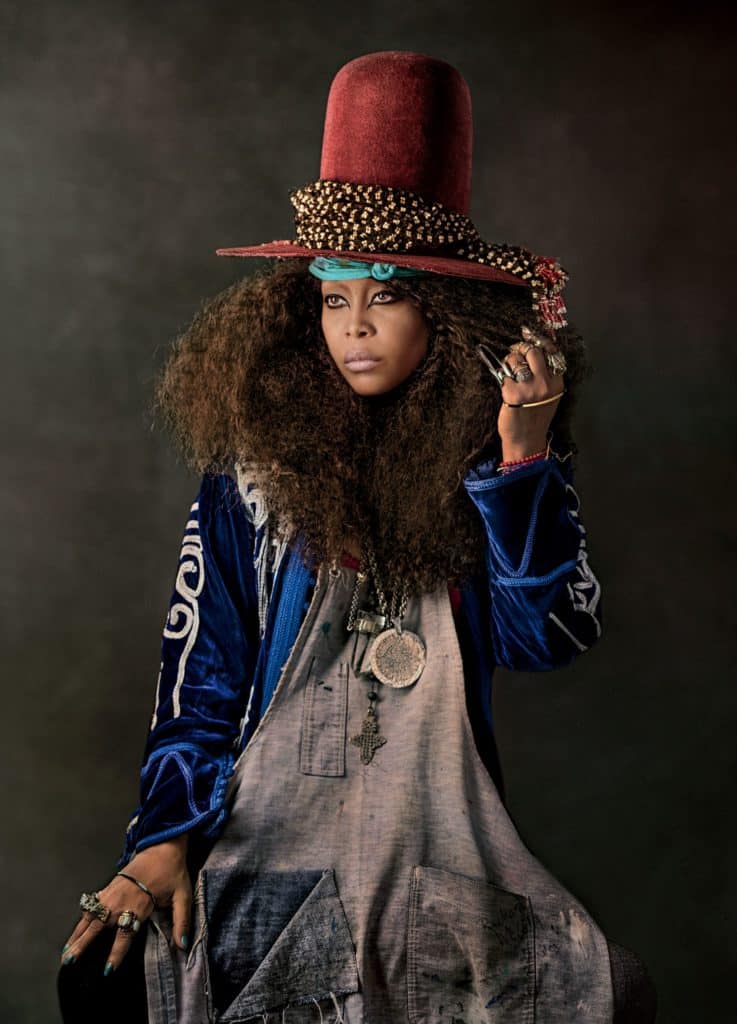
The Queen of Neo-Soul has spent most of her career dedicating herself to her powerful music and influential image that defines her character, persona and entire aura. She is appreciated worldwide for her contributions to the music industry from the late 90s until present day.

Erica Abi Wright was born February 26, 1971 in Dallas, Texas and was raised by her actress mother Kolleen Maria Gipson which exposed her to the arts and music very early. She later chose the name Erykah Badu with “kah” being an Egyptian term for one’s “inner self” and “Badu” being her favorite scat sound. She loved to sing and dance for her mother and soon started to perform in shows at the Dallas Theater Center. She chose Booker T Washington High School for Performing Arts where she flourished while focusing on dancing and singing. During this time, Badu spent a lot of time in the Dallas music community and was known for her talent in freestyling. After high school, she attended Grambling State University where she majored in theater and minored in quantum physics. In 1993, she left Grambling to pursue her musical career. Her 1996 demo caught the attention of music producer Kedar Massenburg who signed her. Kedar Entertainment, at the time a small start-up label later began working with Universal Motown.


Badu’s debut album titled Baduizm served as a booming contribution to the music scene in 1997 with hits such as “Next Lifetime”, “On and On” and “Appletree.” The album began what was labeled as a “Neo-soul” movement and marked a shift in the music of its time. Badu won two Grammy Awards for best female R&B vocal performance and best R&B album following Baduizm. Later that year, Badu released her second LP Live. During the recording process, Badu became pregnant with her first child, her son Seven Sirius, whose father is Outkast artist André 3000. The album went double platinum and her talent became unmatched and was established with the album’s hit song “Tyrone” which was fully improvised on stage.
Badu then began working with hip hop group the Roots in 1999 to create the song “You Got Me.” From this, Badu won yet another Grammy for best rap performance by a duo or group. That year, she made her TV debut portraying the tortured character Rose Rose in The Cider House Rules. In 2000, she released her third album Mama’s Gun. She was also celebrated for her contribution to the soundtrack of the Spike Lee film Bamboozled. In the following years Badu toured on her “Frustrated Artist Tour” and in 2003 she released an experimental album titled Worldwide Underground which featured some hip hop legends. The song “Love of My Life Worldwide” features Angie Stone, Queen Latifah and Bahamadia which once again won a Grammy, and this time for best R&B song.
In 2004, Badu gave birth to her second child Puma Sabti and that same year she participated in the film Dave Chappelle’s Block Party. where she performed several songs with other R&B singers. In 2005, she launched her own music label, Control FreaQ Records whose mission is to allow its artists to express their creative freedom. in 2008, Badu then released her fourth album New Amerykah Part One: 4th World War. Rolling Stone then named the album as one of the year’s best. In 2009 Badu announced the birth of her daughter Mar Merkaba and the following year released her fifth album. This album titled, New Amerykah Part Two: Return of the Ankh featured singles with softer tones that its predecessor.

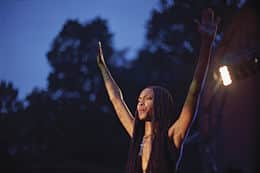
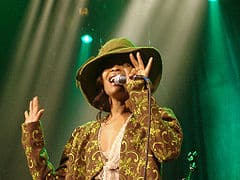
Badu gave back to her community in 2003 as she transformed the unrecognizable Black Forest Theater located in downtown Dallas. She turned it into a space for theater as well as charity events. This is also where her offices for her non-profit, B.L.I.N.D (Beautiful Love Incorporated Nonprofit Development) are located which was founded In 1997. This was a way of bring culture and arts to city areas in order to cultivate change.
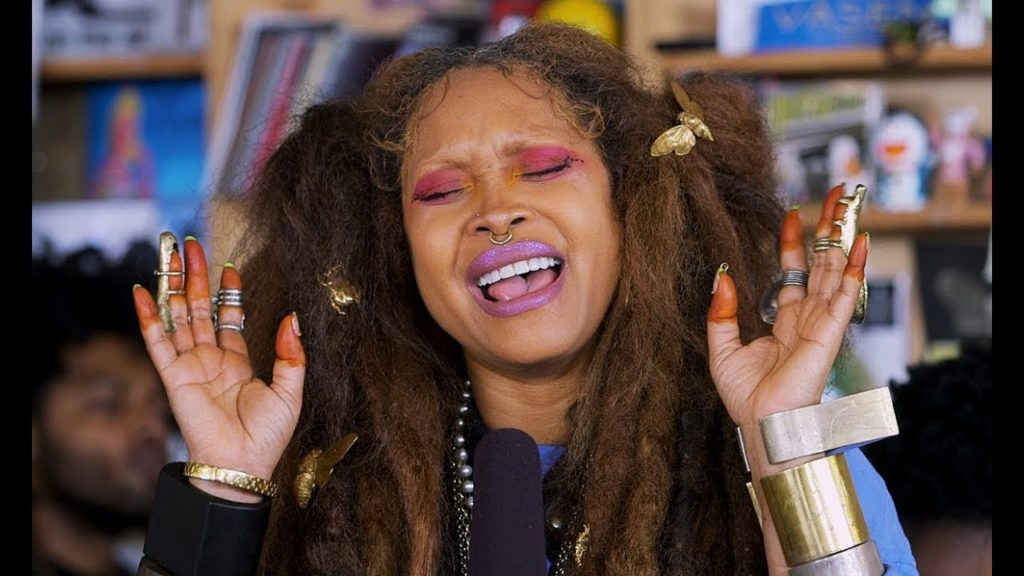

In conclusion, the Queen of Neo-Soul herself has created this image that defines not only her singing style but who she truly is. She is a strong black woman with a major influence on the black community and has done so with grace and confidence. I regard her as one of my favorite artists because of her strength. Ms. Erykah Badu is definitely a legend.

Olsson Göran Hugo, et al. The Black Power Mixtape 1967-1975 : A Documentary in 9 Chapters. Sveriges Television, 2011.
editors, biography.com. “Erykah Badu.” Biography.com, A&E Networks Television, 9 Sept. 2020, www.biography.com/musician/erykah-badu.
“The Official Erykah Badu Fansite.” Erykah, erykah-badu.com/newssystem/news.php
The Editors of Encyclopaedia Britannica. “Erykah Badu.” Encyclopædia Britannica, Encyclopædia Britannica, Inc., 14 May 2020, www.britannica.com/biography/Erykah-Badu.
Marchese, David. “Erykah Badu on Jedi Mind Tricks and How Millennials Hear Music.” Vulture, 24 Jan. 2018, www.vulture.com/2018/01/erykah-badu-in-conversation.html.
Sanneh, Kelefa, et al. “Erykah Badu, the Godmother of Soul.” The New Yorker, 2016, www.newyorker.com/magazine/2016/04/25/erykah-badu-the-godmother-of-soul.

In this course I learned the Roots of the music genre Jazz. This consisted of learning the different styles that emerged from Jazz such as:
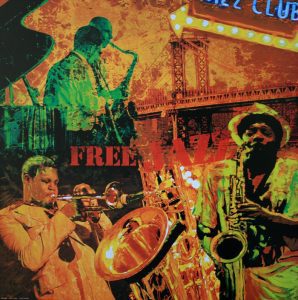
Spiritual Unity Breakdown Track 1 & 4- Ghosts Track 2 – The Wizard Track 3 – Spirits Track 5 – Vibrations Overall Listening to this
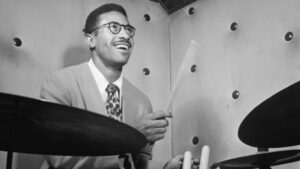
Maxwell or Max Roach was born on January 10, 1924 in NewLand North Carolina. Seeking better opportunities his parents moved Roach and his family to
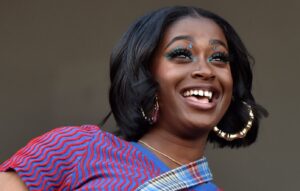
/*! elementor – v3.18.0 – 08-12-2023 */ .elementor-heading-title{padding:0;margin:0;line-height:1}.elementor-widget-heading .elementor-heading-title[class*=elementor-size-]>a{color:inherit;font-size:inherit;line-height:inherit}.elementor-widget-heading .elementor-heading-title.elementor-size-small{font-size:15px}.elementor-widget-heading .elementor-heading-title.elementor-size-medium{font-size:19px}.elementor-widget-heading .elementor-heading-title.elementor-size-large{font-size:29px}.elementor-widget-heading .elementor-heading-title.elementor-size-xl{font-size:39px}.elementor-widget-heading .elementor-heading-title.elementor-size-xxl{font-size:59px} Who is Tierra Whack? Tierra Whack, a Grammy nominee, Double-XXL freshman,

/*! elementor – v3.18.0 – 08-12-2023 */ .elementor-heading-title{padding:0;margin:0;line-height:1}.elementor-widget-heading .elementor-heading-title[class*=elementor-size-]>a{color:inherit;font-size:inherit;line-height:inherit}.elementor-widget-heading .elementor-heading-title.elementor-size-small{font-size:15px}.elementor-widget-heading .elementor-heading-title.elementor-size-medium{font-size:19px}.elementor-widget-heading .elementor-heading-title.elementor-size-large{font-size:29px}.elementor-widget-heading .elementor-heading-title.elementor-size-xl{font-size:39px}.elementor-widget-heading .elementor-heading-title.elementor-size-xxl{font-size:59px} Origins of Jazz Picture this: The dawn of the 20th century,
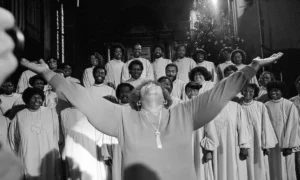
Black gospel music is deeply intertwined with the African-American experience, having evolved into a compelling and influential genre within the broader spectrum of gospel music.

Login to your account